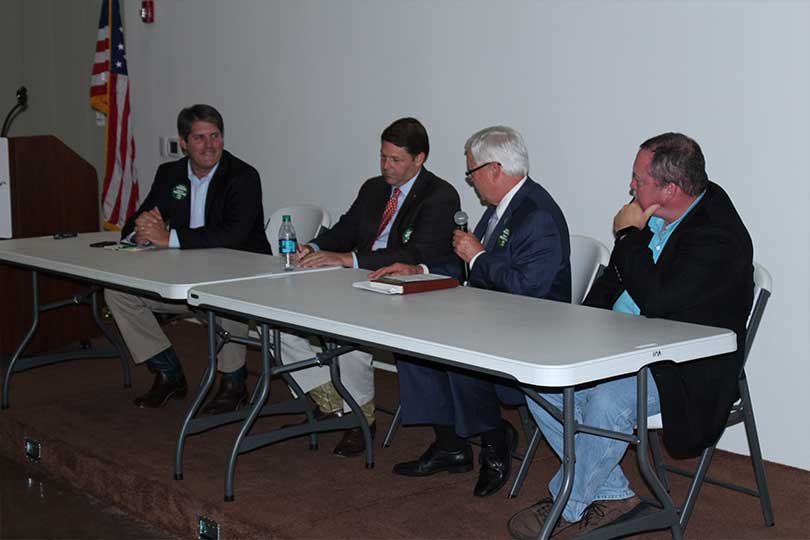By Gene Hall
Publisher
A panel comprised of High Plains economic, academic and political leadership joined forces to underscore the importance of agriculture in the greater Lubbock area last week.
The panel convened Aug. 17 and was organized by the Lynn-Garza and Lubbock County Farm Bureaus. The participants painted a bleak picture of agriculture and the High Plains economy it drives if substantial cuts are made in the farm bill safety net.
Congressman Jodey Arrington, Tom Sells of Combest and Sells Associates, Lubbock Chamber of Commerce President Eddie McBride and Texas Tech University Economist Dr. Darren Hudson described agriculture as the “lynch pin” that holds the West Texas economy together.
“People who are not involved in farming don’t see it,” Hudson said. “They don’t understand there’s this web of economic activity that occurs. On the input side, there are seed dealers and input suppliers, but there’s also food processing, shipping, retailing, food delivery and all sorts of things.”
Hudson said the farm bill and returning cotton to Title I is key to reducing volatility in agriculture and for famers to get financing to operate.
Arrington went a step further, describing the preservation of a domestic food supply as a national security issue.
“All Americans benefit, not only from an affordable food supply and the millions of jobs it creates and the billions of dollars to our economy, but they benefit from a national security perspective,” he said.
The panel focused on other aspects of farm policy, including research. Modern agriculture has succeeded, in part, by taking the long view on research, which has been cut in recent farm legislation. The panel made the case that recent declines in productivity are tied to cuts in research funding.
Arrington said research is the edge for American farmers, dealing with a global marketplace where competitors have other advantages.
“They can pay $2 an hour [for labor],” he said. “They don’t have an EPA.”
Hale County farmer Bobby Byrd described fighting a losing battle with weeds that resist efforts to control them. It’s a growing problem that only research can solve.
Mason Becker of Terry County said its young farmers like himself who are most susceptible to the pinch of low prices and high input costs.
Texas Farm Bureau Vice President Michael White opened the discussion with a call to action.
“There is no one better to tell this story than farmers,” he said. “I read a quote recently, ‘If you’re not at the table, then you’re on the menu.’”
White urged the farmers in attendance to engage on the issue, recounting the advantages of good farm policy and the consequences of not addressing it soon.
Arrington said Congress is about to get down to “brass tacks” on the 2018 Farm Bill debate now that the House Agriculture Committee has conducted listening sessions around the nation. He said President Donald Trump and Vice President Mike Pence are also engaged on the issue.

